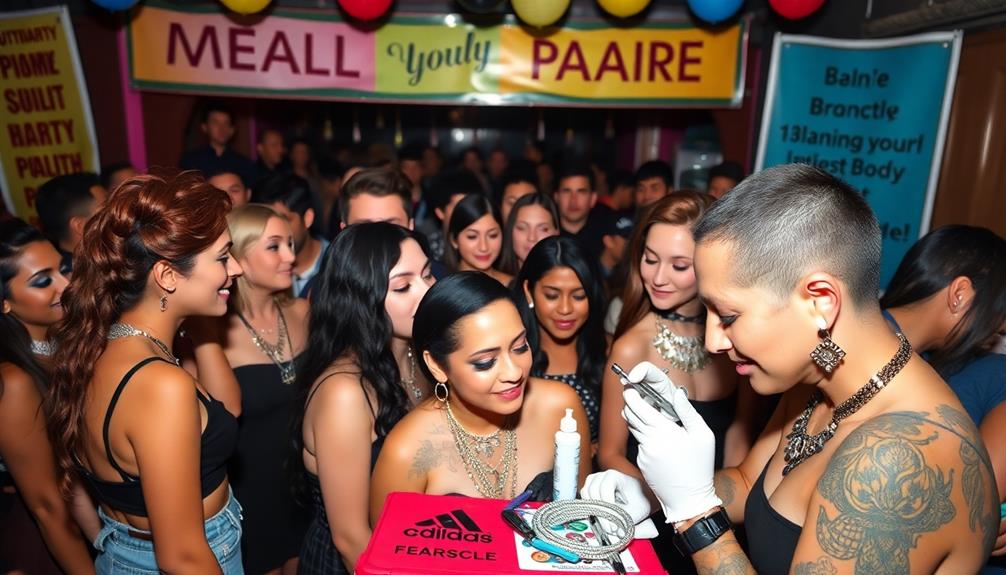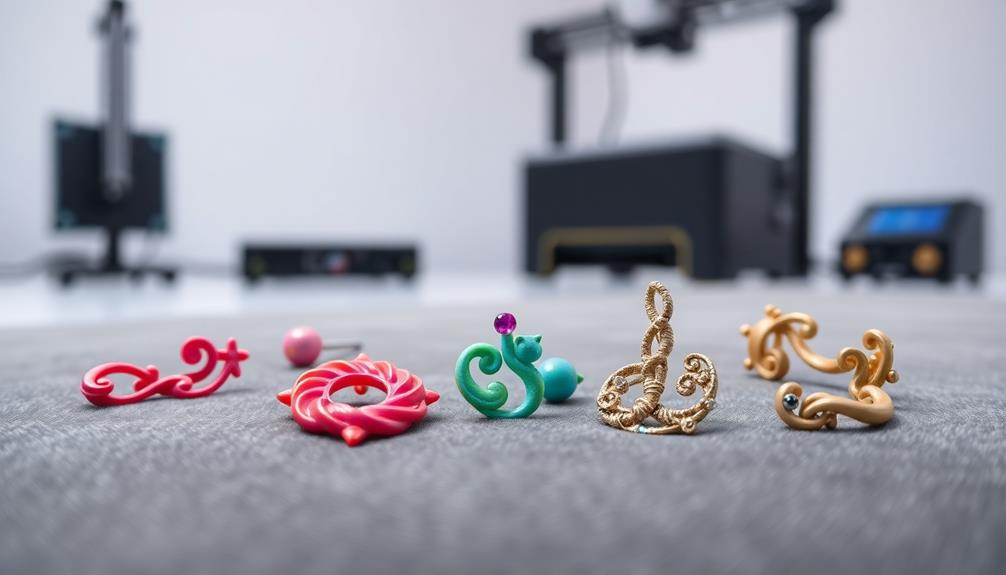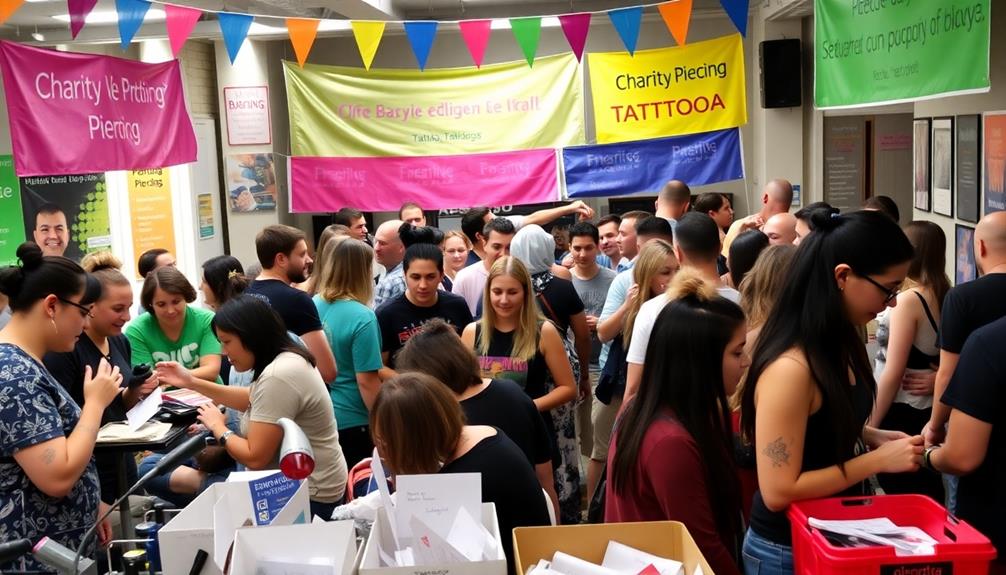Piercing parties can be safe and legal if they're managed correctly. Always hire a licensed piercer who follows proper health regulations to minimize risks. Make sure the venue meets sanitation standards and uses new, sterile needles. When minors are involved, a legal guardian must provide notarized consent in person. Verify that the jewelry is high-quality and sterilized to prevent infections. Keeping these safety measures in mind guarantees a positive experience for everyone. If you want more details about guaranteeing a safe and compliant piercing party, you might find it helpful to explore the guidelines further.
Key Takeaways
- Piercing parties can be safe if conducted by licensed professionals adhering to local health and safety regulations.
- Legal requirements mandate notarized consent forms for minors, with a guardian present during the procedure.
- Compliance with sanitation guidelines and proper sterilization of tools and jewelry is crucial to prevent infections.
- Each piercing event must have its own license, and the piercer's credentials should be verified beforehand.
- Age restrictions vary by state, and clients must provide valid ID for compliance during piercing procedures.
What Is a Piercing Party?
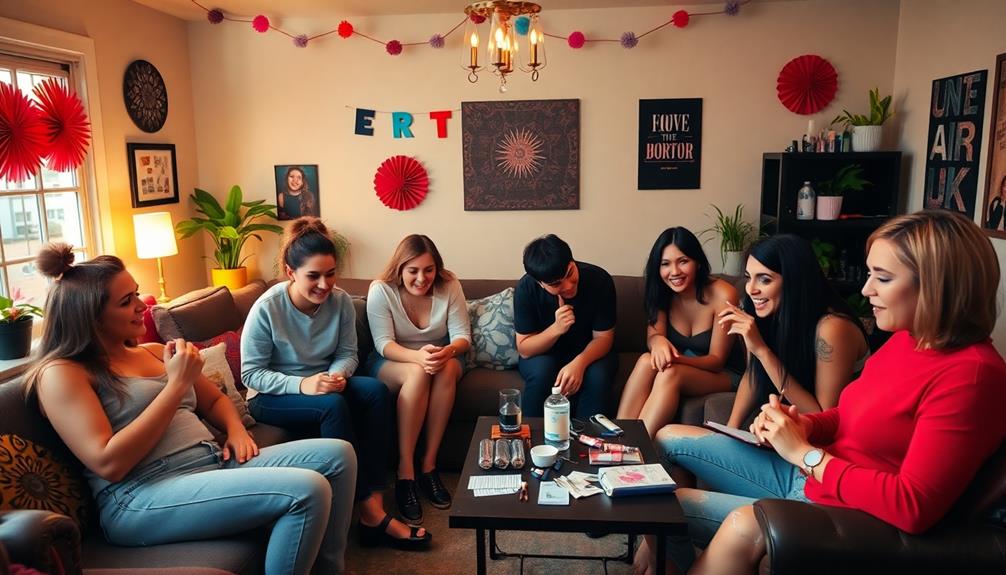
A piercing party is an engaging gathering where you and your friends can get piercings in a relaxed, supportive atmosphere. These events can be the main attraction or part of a larger celebration, allowing everyone to share their experiences and discuss body jewelry options in a comfortable setting.
Safety and hygiene are paramount, so it's essential to hire a licensed piercer who adheres to health regulations. They'll use sterile equipment to guarantee your safety while providing a high-quality experience.
Additionally, piercing parties often offer access to premium jewelry at discounted rates, making it an appealing option for those looking to enhance their collection.
If you're considering bringing a minor to a piercing party, be aware that parental consent is necessary. You'll need notarized consent for any minor to receive a piercing, confirming all legal and safety requirements are met.
This way, you can enjoy the fun and excitement of the event without any worries. Overall, a piercing party can be a memorable and safe experience when you prioritize the right precautions and preparations.
Understanding Local Regulations
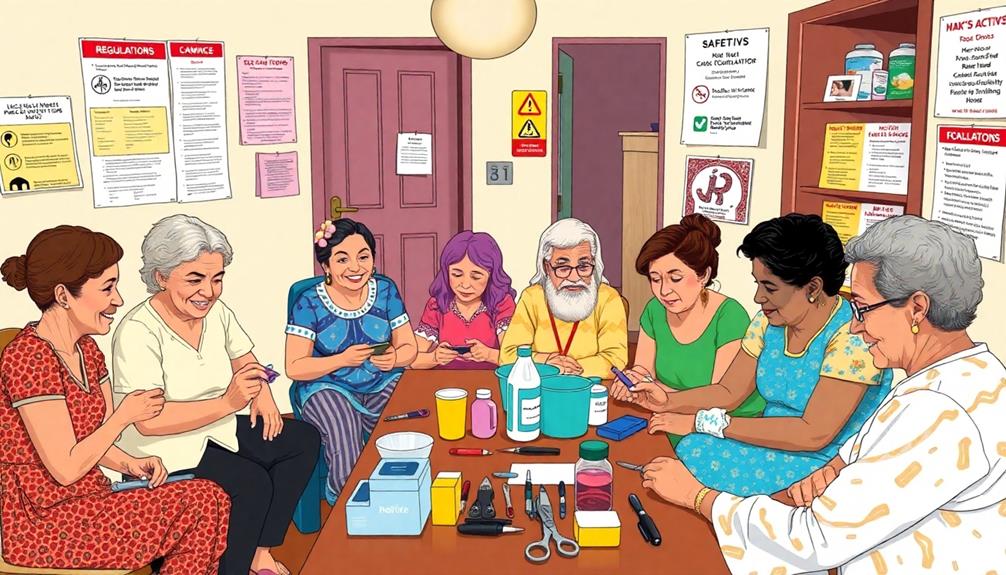
When planning a piercing party, it's vital to understand the local licensing requirements and health standards.
You'll need to guarantee that the piercer has the proper credentials and that the venue meets sanitation guidelines.
Ignoring these regulations can lead to serious legal issues, so always double-check your area's specific laws.
Licensing Requirements Overview
Understanding local regulations is imperative for anyone involved in piercing parties. In Texas, for instance, all tattoo and body piercing studios must hold a current license issued by the Texas Department of State Health Services (DSHS). This license is site-specific and needs to be displayed prominently.
If you're hosting a mobile studio or event, remember that each requires its own license, and you'll need to comply with all Tattoo and Body Piercing Rules.
It's essential to verify that your piercer has the necessary legal certifications and qualifications to guarantee adherence to local regulations.
When dealing with minors, maintaining proper documentation is crucial. You'll need to collect consent forms, and for body piercings, notarized parental consent is mandatory.
If you move your studio or change ownership or name, you'll need to apply for a new license and pay the applicable fees.
By understanding these licensing requirements, you can help guarantee that your piercing party isn't only enjoyable but also compliant with local laws.
Always prioritize safety and legality to protect both the participants and the practitioners involved.
Health and Safety Standards
Safety is paramount at piercing parties, and adhering to local health and safety standards is non-negotiable. In Texas, for instance, you must comply with the Department of State Health Services (DSHS) regulations. This includes obtaining specific licenses for each event location, ensuring that everything is above board.
All piercers at these events need to have proper training in bloodborne pathogens and First Aid/CPR. This professional training helps maintain health and safety during body piercing procedures.
It's essential that sterilization protocols are strictly followed, which means all instruments and jewelry must be cleaned and autoclaved to minimize infection risks.
You also need to document client consent, especially for minors. State regulations require notarized forms for parental consent, ensuring that everyone understands the risks involved.
Compliance with sanitation standards is key, and if there are any infections or allergic reactions, you must report them to health authorities to safeguard public health.
Importance of Licensed Piercers
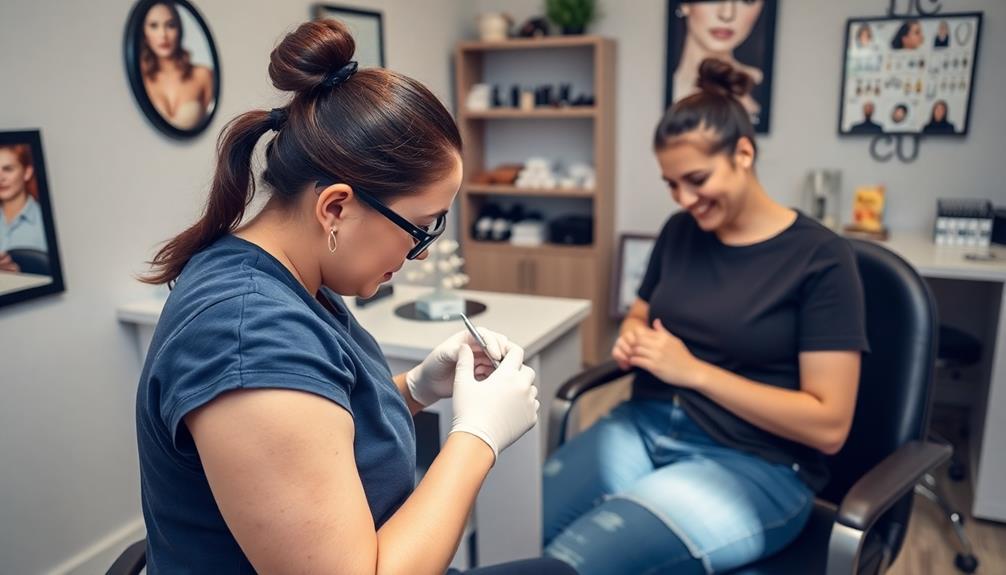
Choosing a licensed piercer is vital for guaranteeing a safe and successful piercing experience. Licensed piercers have met state requirements, meaning they've undergone training and certification in safe body piercing practices. This expertise is significant for minimizing the risks associated with bloodborne pathogens and potential infections.
Here's a quick overview of the importance of licensed piercers:
| Aspect | Benefits | Considerations |
|---|---|---|
| Training | Knowledgeable about safe body piercing practices | Guarantees reduction of infection risk |
| Sterilization Protocols | Uses new, sterile, disposable needles | Prevents cross-contamination |
| Parental Consent | Follows legal guidelines for minors | Guarantees all necessary permissions are in place |
A qualified piercer will also showcase their portfolio, allowing you to assess their experience and the cleanliness of their environment. This is especially important if you're seeking to pierce a minor, as a legal guardian's consent is required. By choosing a licensed professional, you're investing in quality jewelry and a safer body piercing process.
Ensuring a Clean Environment
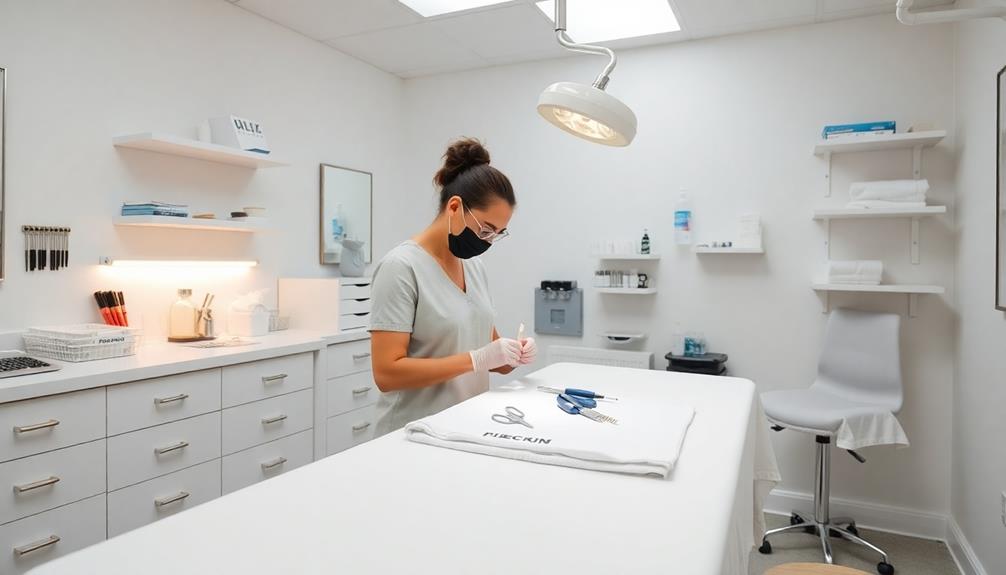
A clean environment is vital for a successful piercing party. When you host one, make certain the venue meets state and county regulations regarding cleanliness and sanitation. This guarantees a safe environment for everyone involved.
Evaluate the location's cleanliness thoroughly, paying special attention to the sterilization of all surfaces and equipment. This step is fundamental in preventing infections during the piercing process.
Consider hiring a professional studio that specializes in private piercing parties. These establishments are typically more committed to adhering to health standards, which contributes to a sterile atmosphere.
Always verify that your piercer uses new, sterile, disposable needles. They should also be trained in bloodborne pathogens and First Aid/CPR to maintain safety throughout the event.
Before the party, request documentation of the sterilization process and confirm that pre-sterilized instruments are on hand. Reviewing this information helps verify compliance with health regulations, allowing you to focus on enjoying the experience.
Selecting Sterilized Jewelry
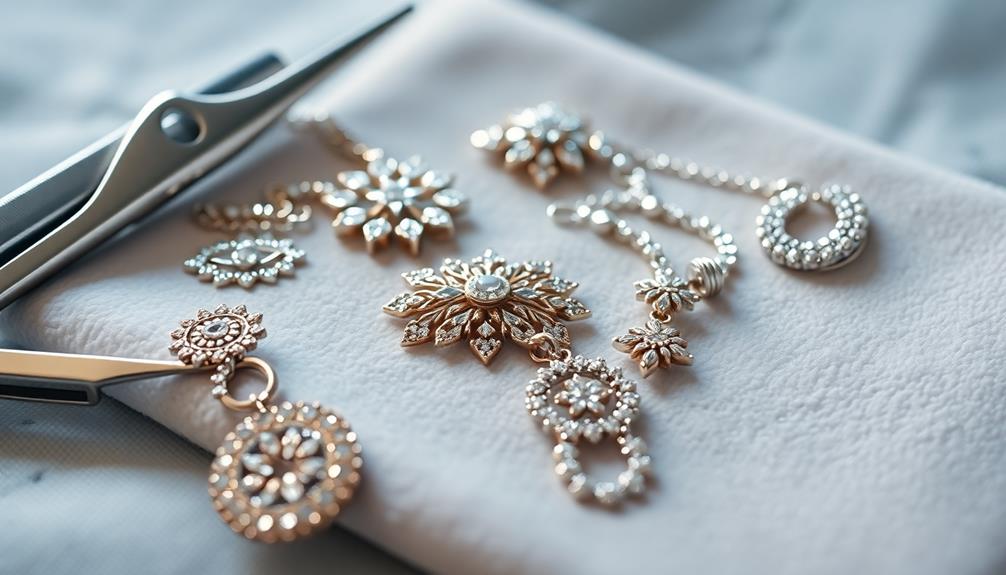
After guaranteeing a clean environment for your piercing party, the next step is selecting the right jewelry.
It's essential to use only sterilized jewelry to minimize the risk of infection and complications during body piercings. Always opt for pre-packaged, sterile jewelry that comes sealed and labeled, confirming its cleanliness before use.
If you're considering bringing your own jewelry, make sure it's made from high-quality materials like surgical stainless steel, titanium, or niobium, which are safe for body piercings.
Verify the source of the jewelry—reputable suppliers should provide documentation proving the sterilization process.
Discuss jewelry options with your licensed piercer in advance to guarantee you're compliant with safety standards. This helps avoid using non-sterile or inappropriate materials that could lead to infections or other issues during the piercing procedure.
Age and Consent Considerations

When it comes to body piercings at parties, age and consent are essential.
If you're a minor, you'll need a notarized consent form signed by a legal guardian, and they must be present during the procedure.
Different states have specific age restrictions for certain piercings, so it's important to know the rules where you are.
Legal Guardian Presence Required
Minors seeking body piercings must have a legal guardian present, as parental consent isn't just a formality but a legal requirement. In a piercing studio, the legal guardian MUST be there to sign consent forms in-person. Pre-signed documents won't cut it, meaning that the minors' parent or legal guardian has to be physically present during the process.
Different states impose varying legal requirements, which sometimes restrict specific types of piercings for individuals under 18, such as genital and nipple piercings, regardless of parental consent. It's essential to guarantee that the piercing studio verifies the minor's age with valid government-issued identification. Remember, student IDs or library cards aren't acceptable for those 18 and older.
Furthermore, studios are obligated to maintain documentation of consent for a specified duration, often up to seven years. This guarantees compliance with legal requirements and protects both the studio and the minor.
If you're a minor looking to get a piercing, make sure your legal guardian understands these rules and is ready to accompany you to the piercing party.
Notarized Consent Forms Needed
For those planning to attend a piercing party, notarized parental consent forms are a must-have for minors. This requirement guarantees that legal guardians are involved in the body piercing decision-making process.
Remember, consent can't be signed in advance; it must be completed in person at the event to comply with legal requirements. To help you navigate this process, here are four key points to keep in mind:
- Notarized Consent Forms: Always have the notarized consent form ready, as it confirms parental approval for the piercing.
- Types of Piercings: Be aware that some studios may restrict types of piercings available to minors. Nipple and genital piercings are typically off-limits for those under 18.
- Identification: Clients aged 18 and older must provide valid government-issued identification to confirm their age.
- Documentation: Professional piercers must maintain proper documentation of consent forms for compliance with state regulations and potential inspections.
Age Restrictions for Piercings
Maneuvering age restrictions for body piercings can be tricky, especially if you're a minor or a parent of one. When it comes to body piercings, parental consent is mandatory for anyone under 18. Most states require a guardian to be present during the procedure, and you'll need to have a notarized consent form ready for legal validation.
Keep in mind that consent for minors must be signed in front of the piercer at the appointment, not beforehand. This guarantees that the piercer can verify the guardian's approval in real-time.
Age restrictions can vary considerably by state, with some allowing body piercings for minors aged 16 and older under specific conditions.
Moreover, studios may have their own rules about which types of piercings minors can get, especially for sensitive areas like nipples and genitals.
Health and Safety Best Practices
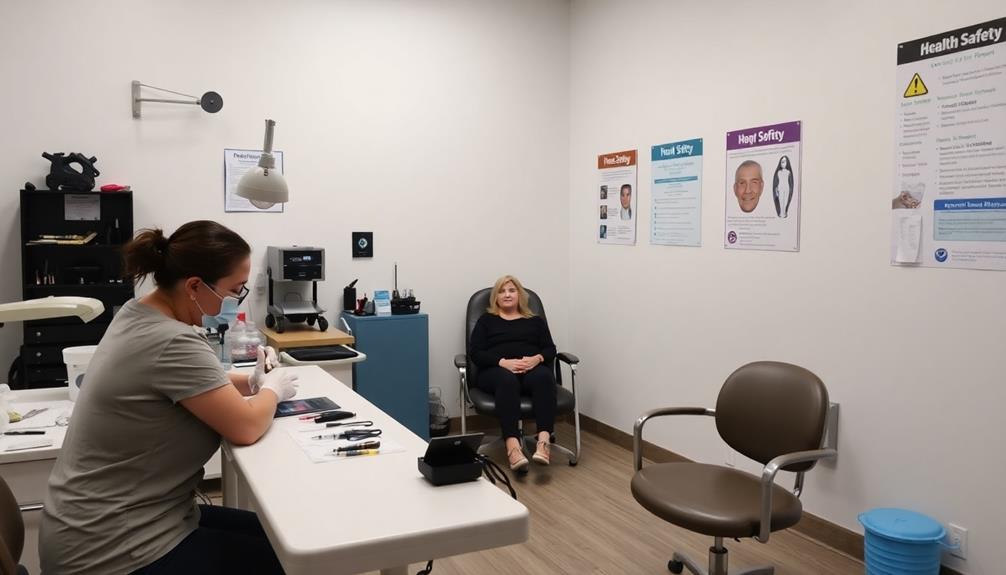
Hosting a piercing party can be a fun and memorable experience, but guaranteeing health and safety best practices are in place is important. To create a safe environment, follow these guidelines:
- Hire a Licensed Professional: Confirm the piercer you hire has a license issued by the state and must have a current certification in bloodborne pathogens and First Aid/CPR. A professional would know how to minimize risks effectively.
- Sterilize Jewelry: All jewelry used during the piercing must be autoclaved and sterilized beforehand to prevent infections and complications. This step is non-negotiable.
- Document Consent: If you're piercing minors, be sure to sign a consent form, which includes notarized parental consent. Adhering to specific regulations is essential for legality.
- Maintain Hygiene Standards: It's important to provide a safe environment by maintaining meticulous hygiene standards. This includes thorough handwashing and using new, sterile, disposable needles during each procedure to prevent cross-contamination.
Frequently Asked Questions
What Types of Piercings Are Commonly Offered at Piercing Parties?
At piercing parties, you'll commonly find ear piercings, including lobe and cartilage, along with nose and belly button piercings. Some may even offer eyebrow and lip piercings, depending on the host's expertise and available equipment.
Can I Bring My Own Jewelry to a Piercing Party?
While some people prefer using provided jewelry, bringing your own can offer a unique touch. Just check with the host first; they'll let you know if it's allowed and meets safety standards.
How Can I Verify the Experience of the Piercer at the Party?
To verify the piercer's experience, ask about their training, certifications, and years in the field. Check online reviews and social media for feedback. Don't hesitate to request a portfolio showcasing their previous work and techniques.
Are There Any Risks Specific to Group Piercing Events?
When you gather like stars in a night sky, remember that group piercing events carry risks. You might face infections, cross-contamination, or less personalized care. Prioritize your safety and choose wisely for your body's canvas.
What Should I Do if I Experience Complications After a Piercing?
If you experience complications after a piercing, you should clean the area gently, avoid touching it, and consult a healthcare professional immediately. Don't ignore signs of infection or unusual symptoms; prompt action can help prevent worsening issues.
Conclusion
In conclusion, while piercing parties can be fun, safety and legality shouldn't be overlooked. Did you know that nearly 50% of people experience complications from piercings done in unregulated settings? Choosing licensed piercers, maintaining a clean environment, and ensuring you have consent are essential for a safe experience. So, if you're considering hosting or attending a piercing party, prioritize these factors to keep it enjoyable and risk-free for everyone involved.
Hi, my name is Danielle, and I’m an author for piercings-body.com. I have a passion for writing and love to share my knowledge on all things body piercing-related. I’m also a huge advocate for safe body modification practices and believe everyone should be able to make informed decisions about their bodies. When I’m not writing or blogging, I enjoy spending time with my family and friends, practicing yoga, and exploring new places.

